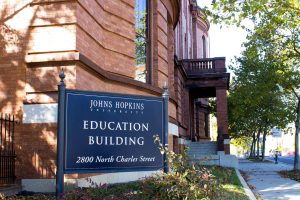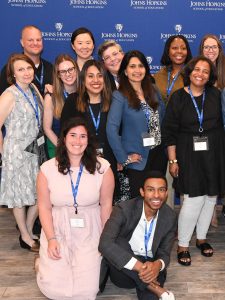Application Details
Prerequisites to Apply
Prospective applicants must first apply and be accepted to the TFA or TNTP Program. For more information, please visit the TFA or TNTP websites.
The minimum eligibility requirements are:
- Be a full-time pre-K–12 teacher by the start of the academic year to which you are applying
- Have an earned a minimum cumulative grade point average (GPA) of 3.0 (on a 4.0 scale) in all previous undergraduate and graduate studies (including for incomplete programs of study and programs still in progress)
- Be in good standing with TFA or TNTP
- Be a member or alumni of the TFA Corps OR have completed the first year of teaching as a TNTP fellow
Application Requirements and Deadlines
| MS in Education – Educational Studies (Teach for America & TNTP) | ||
|---|---|---|
| Application Deadline* | July 15, 2026 | |
| Application Requirements | Online application form | |
| Official transcripts from all post-secondary institutions attended. | ||
| Letter of Intent | Your letter of intent serves as a statement of purpose and should fully address all the following parts of the prompt. Submissions that do not address all parts of the prompt will not be considered for admission. -What is your rationale for choosing to apply to the master’s degree at this point in your career and how do you expect that your participation in this degree program will impact your professional future? -What do you believe are your strengths and weaknesses in terms of being prepared for graduate-level work in this program? -How do you plan to balance the demands of being a full-time teacher and successful graduate student? -How will you manage the demands unique to an asynchronous, online program? | |
| Formatting Instructions | -12 pt font -Arial or Times New Roman typeface -No more than 600 words -Double-spaced -1-inch margins | |
| Resume/CV | ||
| *Your application is considered complete once all required transcripts have been received by our admissions office. | ||
Tuition and Fees
Tuition and fees are subject to change for ensuing academic years and will be updated on the School of Education website accordingly.
Financial Support Options
The Johns Hopkins School of Education offers a range of financial aid options, including grants, scholarships, federal loans, and work-study programs, to help you fund your education.
Start your application today.
More Information
Baltimore, MD 21209
Suite M-500
What to Expect
Curriculum
The MSEd program curriculum focuses on content that is meaningful, relevant, and authentic for teachers in a variety of school settings and regional locations throughout the country. The curriculum is aligned to research-based best practices; provides opportunities for critical thinking, collaboration, and reflection; and encourages candidates to apply their learning to their instructional practice.
The curriculum is organized by a series of courses that candidates take throughout their time in the program:
- The Seminar in Transformational Leadership and Teaching series is made up of four courses. Each of the seminar courses allows for candidates to take a deep dive into three topics that impact classroom culture, curriculum, and instruction. The final session in each seminar course includes a focus on reflection and continuously increasing effectiveness.
- The Classroom Management series includes two courses where candidates explore how to refine their classroom culture and management strategies to support positive mindsets that lead students to reach their academic goals. Candidates learn how to include families and caretakers as active participants in their children’s education.
- The Effective Practices in Teaching and Learning series focuses on the most foundational ideas, strategies, and skill sets needed to be an effective educator. Candidates explore special education and how to plan for instruction that includes all students. Candidates learn and implement backwards planning and create and implement effective assessments.
- The Teaching for Transformation series teaches candidates how to integrate ideas of access and advocacy into their instruction. Candidates also dive into best practices for planning and instruction within their specific content area and grade band.
- There are also multiple opportunities for candidates to deepen their practice by selecting to take Literacy courses and program-approved electives.
Capstone
As the capstone of their degree, graduate candidates build a digital portfolio. This serves as a demonstration of a candidate’s understanding of the transformational teaching paradigm outcomes and the InTASC Standards that guide and influence teaching.
Candidates enroll in an online course dedicated to the process of gathering artifacts and building a capstone portfolio. As graduate students, candidates have focused and continue to focus on developing a deeper understanding of their work in the classroom. Once candidates begin the capstone course, they will spend several months creating a capstone. This is created in lieu of a master’s thesis and is based upon experiences from classroom teaching and graduate coursework.
Candidates will build the following sections, focused on the four transformational teaching paradigm outcomes:
- Access
- Advocacy
- Culturally responsive teaching
- Dramatic academic growth
The capstone is a holistic reflection of candidates’ best work and their growth as teachers during their time in the program.
edTPA
edTPA is a performance-based, subject-specific assessment and support system used by teacher preparation programs throughout the U.S. to emphasize, measure, and support the skills and knowledge that all teachers need from their first day in the classroom.
edTPA is a subject-specific assessment that includes versions for 27 teaching fields, ranging from pre-kindergarten through high school. The assessment features a common architecture focused on three tasks: planning, instruction, and assessment. For candidates in elementary placements, a content-specific fourth task may also be necessary.
edTPA requires aspiring teachers to demonstrate readiness to teach through lesson plans designed to support their students’ strengths and needs, engage real students in ambitious learning, analyze whether their students are learning, and adjust their instruction to become more effective. Teacher candidates submit unedited video recordings of themselves at work in a real classroom as part of a portfolio that is scored by highly trained educators in their content area. edTPA builds on decades of teacher performance assessment development and research regarding teaching skills and practices that improve student learning.
The edTPA course is a 16-week course designed to prepare and support candidates toward a successful edTPA submission. Candidates will be broken up into content-specific groups and assigned an edTPA facilitator. This facilitator will act as a content expert, provide high-level non-corrective feedback, and host various conferences to support positive academic outcomes.
Student Outcomes
Upon successful completion of the MSEd degree, we expect each graduate will:
- Collaborate with colleagues on a variety of relevant topics
- Develop awareness of current best practices in the field of education, including those related to teaching students with special needs
- Apply course resources and learning to instructional practices and to colleague, student, and family partnerships
- Plan and execute meaningful opportunities for students according to the principles of student access, advocacy, Culturally Responsive Teaching and Academic Growth
- Demonstrate proficiency in topics including backward design, data analysis, differentiation, classroom management, family engagement, and culturally responsive teaching
- Engage in opportunities for meaningful reflection and commitment to continuous growth and ongoing development
IMPORTANT QUESTIONS AND ANSWERS
What does TNTP stand for in education?

Formerly "The New Teacher Project," TNTP is a U.S. nonprofit organization that partners with schools to enlist diverse teachers.
TNTP is central to the Johns Hopkins Master of Science in Education: Educational Studies (Teach For America & TNTP) program, as this degree program is designed specifically for TNTP alumni aiming to advance their education.
Does Teach For America offer tuition assistance or career benefits for earning a master’s in education?

While Teach For America does not directly pay for a master’s degree, members can access valuable financial and career benefits through its network.
The Johns Hopkins Master of Science in Education: Educational Studies (Teach For America & TNTP) program offers waived application and registration fees and a frozen tuition rate for two years, helping reduce overall costs. Completing a master’s degree can strengthen your teaching skills, open doors to leadership roles, and increase your earning potential in education.
What are career and financial benefits of earning a master’s in education?

Earning a master’s degree in education can open doors to a wider range of career opportunities and higher earning potential.
Graduates often qualify for leadership roles such as department chair, instructional coach, curriculum specialist, or school administrator, and many find advancement in areas like policy, research, or higher education. Financially, teachers with a master’s degree typically earn higher salaries than those with only a bachelor’s, and the degree can improve job security and long-term growth prospects.
What is the acceptance rate for Teach For America?

Teach For America (TFA) typically accepts about 15% of applicants.
Similarly, the Johns Hopkins Master of Science in Education: Educational Studies (Teach For America & TNTP) program selectively enrolls high-achieving individuals passionate about making a difference in education and dedicated to advancing equity in our schools.
International Applicants
This program is delivered in a fully online format and does not offer F-1 or J-1 visa sponsorship for international students. International students interested in applying to a program at the Johns Hopkins School of Education must follow the same application process and submit the same general application materials as their peers, along with some additional requirements.
International Student Admissions
Please visit the International Student Admissions webpage for additional application requirements or information.


International Student Admissions
Please visit the International Student Admissions webpage for additional application requirements or information.


